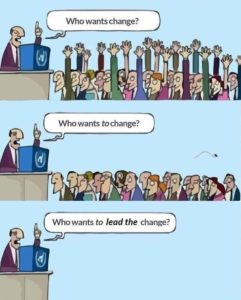
| Date | Author |
|---|---|
| 7th January 2019 | Fola Ikpehai |
| Coaching for Change and Commitment |
| At a recent Change Management Community of Practice event colleagues highlighted a number of barriers to change in the Higher Education Sector. |
I won’t go into these barriers here, but it is this session that made me think about the topic for this blog and the importance of the following three linked concepts for the sector:
A lighthearted visual representation of our challenges with change…
Let’s start with the core concept – ‘Change’. In order to adopt a different way of doing things, we need to understand what we’re doing at the moment, why we need to change, and the tools, training and development required to achieve the change (i.e. ‘the How’). A message that I have heard a lot when leading change initiatives is ‘What’s in it for me and/or my Team!’ or ‘Won’t this change just increase our work-load!’. These messages link to two key points that have to be stressed when implementing change:
In order to deliver change effectively, officers responsible for sponsoring or leading change initiatives have to develop and communicate a vision emphasising benefits that resonate with the recipients of the change. It’s not enough to just have a Vision that works for a select few. Change leads also need to be clear that the change initiative is a journey. People impacted by the change need to understand that benefits will come but will not be apparent immediately – and definitely will not be achieved without some effort on their part. The opportunity to coach through change occurs whenever I’m given the ‘We’ve always done it this way’ defence – definitely one of the main barriers to behavioural, cultural and process change. My response to the familiar “We’ve always done it this way” is “Why?” – and this is where the discussion gets interesting! There is a school of thought that suggests that “Why” questions can seem confrontational and make people defensive. However, in my experience (accompanied with a smile, and the right tone!) I have found that these questions are very good at getting people to pause, reflect and explore the reasons for their current ways of working. This is important because all Coaching Theory highlights the fact that coaching is not effective unless the other person accepts the need for the change. Coupled with appropriate follow up questions, listening, response and feedback (the key techniques used in Coaching), “Why” questions can help to raise and sustain awareness of the need for change, stimulate acceptance, and guide stakeholders through to action. Finally – Commitment to long term, sustainable change… The journey through to commitment doesn’t just happen. It starts with a clear understanding of “What success looks like” – in the short, medium and long-term, and it is sustained through recognition and rewarding of success by senior leadership, as well as sharing stories of success with other individuals and teams. Every Change Manager could wax lyrical about all the benefits to be achieved from the change that they are implementing. However, commitment doesn’t come from the Change Manager. A good news story, or successful experience from a colleague – a ‘real’ person, a ‘real’ team working in the same environment – is worth more than all the Change Theory that a Change Manager can present to make their case. However, forming this force for change within the institution requires nurturing and empowering individuals – which links nicely back to coaching! If you would like help with the journey through to change and commitment for an initiative that you are planning or have underway please contact us at sums@reading.ac.uk. Our team can help discuss the above concepts in more detail or organise a practical ‘Coaching for Change and Commitment’ Workshop for sponsors, change leads and team members. This workshop will help to increase participants’ confidence and capability, enabling them to break through some of the barriers experienced when seeking to implement change in the Higher Education sector. |









